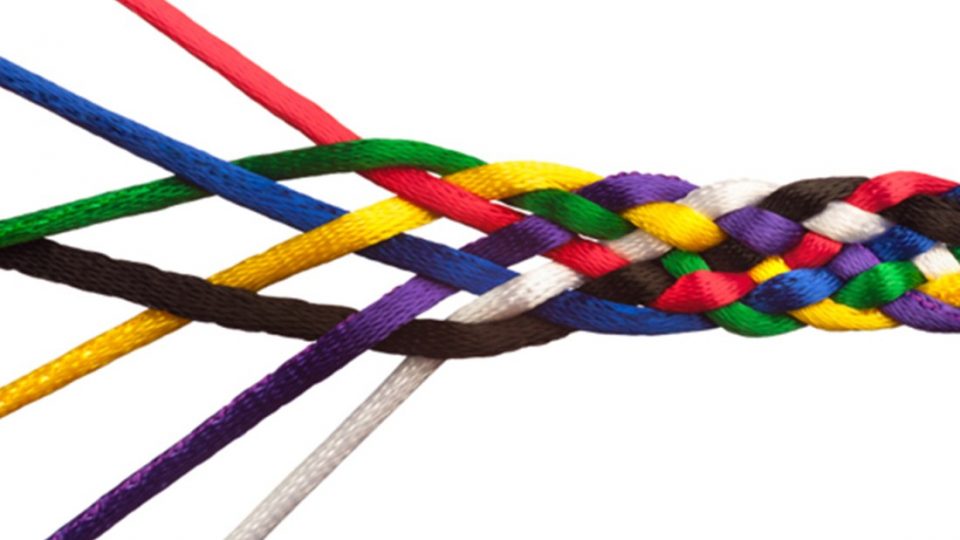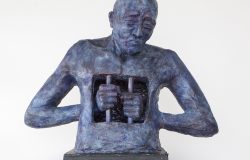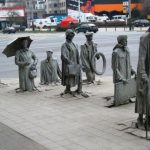“To be yourself in a world that is constantly trying to make you something else
is the greatest accomplishment.”
Ralph Waldo Emerson
When we relate to something or someone it means we have made a connection to that object or person; we feel sympathy for or identify with it. And when we are in relationship with someone or something then we are describing the way in which the two objects are connected and are in sympathy with each other and helping to reflect their identities back to one another. To be human is to be in relationship with the world and others who inhabit it.
Looking around, there are a surprising number of maladjusted connections: relationships that lack sympathy for one another, and that appear to have forgotten that the other person’s needs matter equally. Our lives need contradictions to activate within us adjustment, transformation and learning who we need to be in the world. In truth, we really only see ourselves when we look at others and make meaning from that experience.
None of us is going to be in relationship with another being without conflict arising at some point. And what is conflict? It is when a level of discord occurs because the ideas or behaviours of another become incompatible with our view of the world or our sense of self. That incompatibility may in fact be an invitation to change the way we see the world or the way in which we want to be seen in the world. Psychologists Roy and Judy Eidelson identified five belief patterns that play a significant part in triggering conflicts.
A sense of superiority: a belief that my views and ways of doing things are better than yours. Injustice,which results in an experience that I have been unfairly treated, which will activate conflict as will a sense of vulnerability. If I fear that my worse case scenario will play out because of you and my interpretation of your behaviour, I will move into conflict. Distrust and helplessness will also cause conflict: not trusting your motivations and feeling that no hope exists will spark defensive and protective behaviour in people. Whilst these beliefs cause major political turmoil around the world, they work within one-to-one relationship as well.
Discovering what we need when we have these feelings activated can be a difficult process. We can fool ourselves with self-righteousness and our unconscious biases can leave us imperfectly informed. When I feel or experience distrust, vulnerability or helplessness I may need reassurance and confidence that I can rise up and make it through my circumstances. Injustice calls for a rebalance and re-evaluation of what fair might look like. When I encounter superiority, however, I face my biggest challenge.
A belief that somebody’s reality is better than and more deserving than another’s implies a hierarchy of beliefs. One particular belief need not equate to a larger piece of the pie of life and yet this prejudice shows up continuously. It’s all good and well when the benefits fall in our favour but when the supremacy of others is inflicted on us, we feel the white-hot infuriating rage rising up against moral dominance, entitlement and the special destiny assigned to a particular person or group.
In a relationship, when one person exerts dominance as the superior thinker, decision maker and director of all plans the other person is going to feel less than, devalued and over compromised. Power dominance in a relationship results in war – literal and metaphorical. What we need to aim for in the face of superiority is what the people at The Arbinger Institutecall ‘The Heart at Peace’. This is when the person with delusions of superiority recognises the other person not as an object but rather as a separate person who also has hopes, fears, needs and cares that are as real to them as their own.
Relationships are not all about conflict though. Relationships can help us feel good about ourselves and can bring to us the qualities and attributes we may feel are lacking within us. Relationships, and especially those that are most close to us can validate us and assist us in transcending the sense of our existential self. Those whom we love have a heavy burden of expectation placed on their shoulders. As Esther Perel, the relationship guru of the 21stcentury remarks: when we love another we bring to them our inner life. Our wishes, our feelings, our aspirations, our anxieties. When we talk to them, we want them to look at us. We want contact, we want connection, and we want them to make us feel like we matter.
In the early, heady days of new love, the person we love enchants our imagination and their charms fulfil our deep sense of emotional connection. Two become one and gradually the ordeal of relationship begins. It’s an ordeal because it is a test – a tightrope walk across a mysterious abyss of the unknown. The other may have a sense of their path to individuation as may you, but none-the-less this other person will act as a mirror and counter balance to your heroic strivings for the polarised opposites of togetherness and autonomy. So we hopscotch from a desire for security and safety to a longing for adventure and novelty. We crave belonging and connections yet have an inner longing for separateness and freedom. It’s the paradox of life and all relationships.
If we want to keep our relationships alive rather than simply not dead, Perel urges us to bring our best, most radiant selves into the relationship rather than to our careers or other social connections. Some people save their most engaged and dazzling selves for social media sites and their kindest and most compassionate selves for the people in the office. Gradually the single most corrosive force of relationships can set in – criticism. In truth, a criticism is an unexpressed wish. When our partner critiques us saying, ‘you’re so lazy, why haven’t you unpacked the dishwasher?’ what they may be asking is ‘I wish you could help me by unpacking the dishwasher’ The criticism is a personal attack; the expressed wish is directed towards the desired behaviour.
Dr John Gottman is quoted liberally in couples counselling and relationship workshops and his four horsemen of the apocalypse of relationships are: criticism, defensiveness, stonewalling (refusal to communicate or cooperate) and the ruthless destroyer, contempt. The anti-venom, so to speak is learning better strategies for communication. When we realise that the truth of our experience is not necessarily the truth of what happened we allow multiple possibilities to co-exist. And possibilities are the harbingers of hope and change.
You don’t have to agree with the other person’s view of how things unfolded but you can appreciate that there’s another person who has a completely different experience of the same reality. Multiple realities can co-exist and thrive. More importantly, alternative views can teach us about how others think and feel and experience the world and we might choose to adopt and learn something from these alternative perspectives. In short, I can learn more about me through others.
Critical attacks need to move towards gentler expressions of what we would need from the other. Making requests instead of demands and avoiding the gross generalisations that intensify our feelings: the always and never statements that automatically cause people to get on the defensive. Instead of defending we can try taking responsibility for our own behaviour. Feedback is a gift because someone is offering you a perspective that might make your life easier, might be a useful strategy for solving a problem or a clue for what matters to them.
Stubbornly ignoring the opportunities for dialogue can be replaced with more helpful, self-soothing techniques: visualising peaceful images, going for a walk, taking a shower or having a good old cry might release us from our vengeful stonewalling behaviour and move us towards feeling more open to an amicable truce. Contempt requires immediate intervention.
When you hear someone using hateful language the derision hides an underlying unexpressed feeling or need. The need may be based on a faulty worldview and destructive self-belief but without learning to express the need effectively the contempt-filled person has little chance of breaking out of the boundaries and limitations they have imposed on themselves.
When another person triggers a response from you that makes you feel disrespected, ignored or devalued recognise the two realities at play. Is this about you or this about them? If it’s about you then work out if it is a signal from life that reminds you it’s time to upgrade your self-beliefs and to re-energise your worldview. It may be an invitation for you to offer up an opportunity for the other person to upgrade their self-beliefs and re-energise their worldview.
Contempt speaks volumes about the person expressing the hateful talk. It may be difficult to show compassion for such behaviour. Really, it’s their fear and shame, guilt and insecurities getting tangled up and contained in the tiny space of limiting beliefs and bursting out of them as derision. We can be both a teacher and learner in these moments.
The ultimate relationship, of course, is the connection you have with your self. How aware have you become of your unique psychological reality and the psychological fingerprints it leaves on the world. Knowing your strengths and limitations and how those expand into the world and impact everything around you makes you have a greater appreciation for the human condition.
Becoming your own individuated self is a process you can only perform in relationship with others. Your individuation makes you aware of the allowance we need to create for all humans to have the opportunity to individuate and divest themselves of the false wrappings of the ego. Just as the connection we feel with another can make us feel validated and transcendent those self-same relationships can bring turmoil and conflict into our lives. The feelings of unification and separateness and the desire to have both within the same relationship will alert us to what we want from the world and what the world wants from us.
It’s a strange and beautiful paradox that we can only learn how to be the best version of ourselves in relationship with others and the world. The experience of life and your relationships with it make you who you are.
“Life is beautiful not because of the things we see or the things we do.
Life is beautiful because of the people we meet.”
Simon Sinek
If you’d like to learn more about the power of relationships and how conflict can make you grow why not attend the Made Better Human event in November. Its running in Brisbane, Australia and you can register using the following link:
Navigating Relationships – Made Better Human Event






